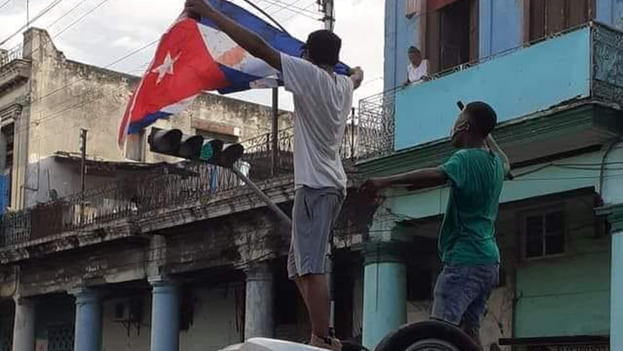
![]() 14ymedio, Havana, January 28, 2023 — On Thursday, the court of Crimes Against State Security of Havana’s Provincial Tribunal handed down sentences of up to 15 years in prison for another nine 11J [11 July 2021] protesters charged with sedition.
14ymedio, Havana, January 28, 2023 — On Thursday, the court of Crimes Against State Security of Havana’s Provincial Tribunal handed down sentences of up to 15 years in prison for another nine 11J [11 July 2021] protesters charged with sedition.
The accused, ranging from 25 to 39 years of age are: Lázaro Yurisan Sarduy, sentenced to 14 years in jail; Lázaro Osmel Salinas (to 15 years); Yoslien Rosa and Yunier Sánchez (both to 11 years); Deyvis Javier Torres, Carlos Pérez Cosme and Reinier Borrell (10 years); and Alcides Peró Candó and Manuel Bermúdez (both received 5 years of correctional labor without internment).
Prosecutor Roeldys Matos Delgado accused the young people of “tumultuously agitating the social order and discipline” in addition to assaulting authorities and contributing to “undermining the socialist system.” He admitted that the protesters were “thousands of people,” in contrast to the official versions the state-run press tried to impose.
Matos stated that the “mob” advanced from the areas surrounding the theater in the Havana neighborhood of Mantilla, through Diez de Octubre, a main road, shouting “offensive phrases” against Miguel Díaz-Canel and the police. The Prosecutor also accused the protesters of using “rocks, sticks and various objects” against the agents at the “popular” Esquina de Toyo, on Diez de Octubre.
Esquina de Toyo was one of the most significant scenes on 11J. One of the young protesters climbed atop of an overturned patrol car and waved a Cuban flag, an image that became one of the most iconic of the protest. The “young man with the flag,” whose name was Elías Rizo, managed to leave Cuba following the protests and, after a long journey, settle in Madrid.
The accused, according to Matos, “climbed on top” of police patrol cars and managed to overturn them as a “show of contempt.” The crowd’s retreat occurred in the area of Vía Blanca, where police repressed protesters more harshly. After presenting their version of the events, the prosecution sought up to 27 years in jail for the young people.
The defense denied all the Prosecutor’s accusations and, in the case of Borrell, presented that he wasn’t even with the protesters, but rather riding his motorbike to the Esquina de Toyo “out of curiosity.” Other attorneys presented similar arguments about the lack of “direct” participation of the accused in the events of 11J. The defense team for Sarduy, who has had AIDS since 2019, reasoned that there was not enough evidence to prosecute him.
The Prosecutor’s response, as stated in the sentencing document, was to insist in the accusations and accept the events as “proven.” Furthermore, he alleged that the young people shouted, “Freedom!” at the top of their lungs and sang the chorus of Patria y Vida, a song “inspired in sentiments contrary to the state’s socialist system,” the agents had also heard them say, on more than one occasion, “Díaz-Canel, you are a motherfucker.”
Matos stated that if the police officers had drawn their weapons it was to shoot, as in the case of Yovani Viera, 14 shots into the air to “protect his colleagues.” Furthermore, he made a special effort to denigrate all the accused, attributing to them, “a violent nature,” “vulgar vocabulary,” “scarce relationships with their neighbors” and a propensity for “scandal.”
The tribunal, which was presided by Nelson Delgado and included Irela Heredia, Carlos Hurtado Castillo, Mercedes Ramos and Juan Sosa, assessed the events, the testimony of the witnesses — most of them police officers and public officials — and the videos used by the experts to identify the protesters, and sided with the Prosecution.
On January 23rd, we learned of another sentence from the same tribunal against 15 protesters whose total sentence equaled 75 years. Among the accused was Jonathan Torres, who at the time of the events was only 17 years old. The arguments made by the Prosecutor were similar and were well received by the tribunal.
The following day, in East Havana, another 10 people were tried, among those was instructor Pedro Albert Sánchez, charged with public disorder, assault, resisting arrest and contempt. The sentences were up to eight years in prison.
The 11J trials, which since the beginning have been used to set examples, were discussed by Minister of Justice, Óscar Silvera, in a meeting with ambassadors from the European Union last week. During that meeting, Silvera signaled to the diplomats that offering amnesty to the protesters was an impossibility.
Translated by: Silvia Suárez
____________
COLLABORATE WITH OUR WORK: The 14ymedio team is committed to practicing serious journalism that reflects Cuba’s reality in all its depth. Thank you for joining us on this long journey. We invite you to continue supporting us by becoming a member of 14ymedio now. Together we can continue transforming journalism in Cuba.
